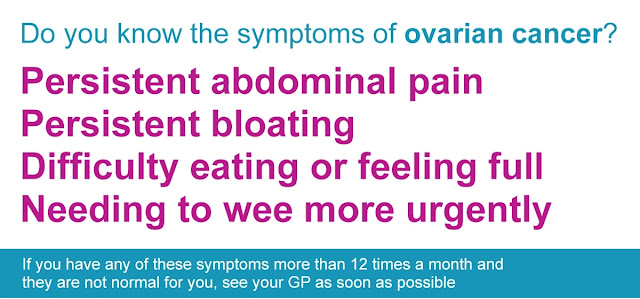March is “Ovarian Cancer Awareness
Month” and here we bring you some of the common myths about the ovarian cancer.
- It is a “Silent Killer”: Often, ovarian cancer is referred as a silent killer since it has no symptoms. However, it is not true. The key symptoms of ovarian cancer are persistent bloating or increased stomach size, persistent stomach pain, urge to pee more frequently and difficulty eating or feeling full quickly. These symptoms can happen to us sometimes, but if the symptoms are unusual and they don’t go away then you should speak with your GP.
- It doesn’t affect young
women: It is not well-known as
some other female cancer and there are a lot of myths surrounding this
disease. Over 7000 women are diagnosed and about 4300 deaths are reported
for ovarian cancer in the UK. Ovarian cancer is the fifth most common
female cancer and often it is associated with women over the age of 50.
Though it is true that about 80% of the women over 50 plus are diagnosed
with ovarian cancer, it leaves one in five who are younger.
- It is the same as cervical
cancer: There are lots of
different gynaecological cancers so, its better to be aware of each one of
them. The five main gynaecological cancers are cervical, ovarian, vaginal,
uterine and valvular cancer and each of these have different symptoms. If
you suspect anything is wrong, get to know about your body by speaking
with your doctor.
- Cervical smears will detect it: There is no routine test for detecting ovarian cancer, so a cervical smear won’t detect it. The best way to detect this disease is by being symptoms-aware.
- BRCA means only breast
cancer: Often a BRCA gene mutation
is discussed in the media alongside an increased risk of getting breast
cancer. However, if you have a BRCA gene mutation, then you have a
35-60% increased chance of developing ovarian cancer too. BRCA gene
mutations can be hereditary.
- You can do nothing to
reduce its risk: Taking
contraceptive pills could reduce your risk of ovarian cancer. A few
lifestyle factors such as obesity, smoking, giving birth to your first
child after 30’s, not breastfeeding, not having any children and using HRT
can increase your risk of developing ovarian cancer. Other contributing
factors include, getting older, having endometriosis and a family history
of breast and ovarian cancer.

- Women who have done as
hysterectomy can’t get ovarian cancer: There
are different
types of hysterectomy. In most cases, the womb and the cervix are
removed and in certain cases, the Fallopian tubes and ovaries too, are
removed. Although removal of the ovaries reduces the risk by 95%, but
still there is a 5% risk of developing ovarian cancer cells. You are also
at risk of developing peritoneal cancer, which is similar to ovarian
cancer.
- HPV vaccine helps: Sadly, HPV (Human Papilloma Virus) vaccine
does nothing in the way to prevent the ovarian cancer. Though this vaccine
protects against cervical cancer, but currently there is no equivalent
vaccine available to protect the women from developing ovarian cancer.


No comments:
Post a Comment